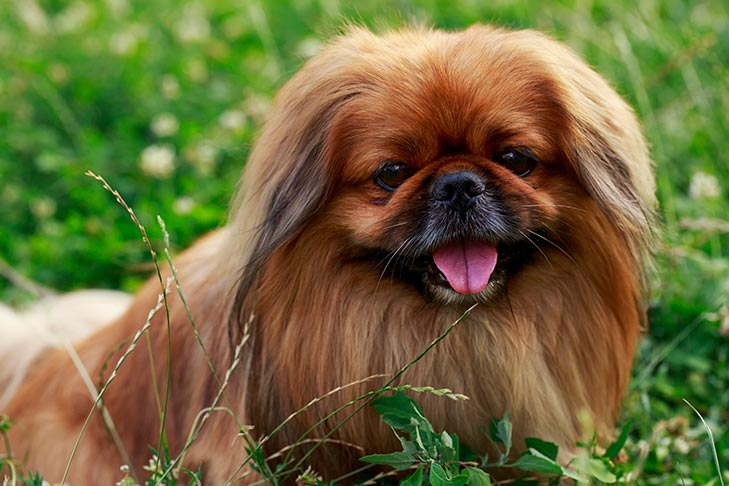In today’s post, we will travel to China. Place of origin of one of the oriental breeds that we can currently enjoy relatively recently. It is the Pekingese dog. A breed that was only discovered in 1860. Do you want to uncover more about it? Keep reading below.
Origin of the Pekingese
Where Does the Pekingese Dog Come From?
To know the origin of the Pekingese dog, we have to go back to a Chinese legend that tells that Buddha reduced a lion to the size of a dog. Maybe not so much because of Buddha, but because of the hand of man who gave birth to this breed many years ago in the back of Europe.
It was the Chinese nobility that took care of breeding flat-faced dogs like the pug or the Shih-Tzu, because the Chinese were looking for this characteristic in the animal since it was related to their mythology.
These animals were so beloved that stealing a dog meant death for the thief. In addition, they were revered by Buddhist monks for their reminiscence of the Fu lions.
Fu lions are like gargoyles in Europe. For Buddhism, these lions are protectors and defenders of the law, they are found guarding many buildings, palaces and houses. The males protect the members of the household when they travel and the females protect the house. Its flat appearance is reminiscent of the Pekingese dog and other breeds of Chinese origin.
This breed was completely unknown until the Opium Wars, when British troops invaded Beijing and the emperor’s house in 1860, where only a few specimens survived. The dogs were brought by British soldiers to Queen Victoria and soon became known in the rest of Europe, gaining much popularity.
Character and behavior of the Pekingese
What is the Pekingese like?
The Pekingese was designed to live in palaces, so it is loyal to its own but wary of strangers. They are quite independent and attentive to their surroundings, which makes them a good watchdog. Although they can also become quite carefree with other animals and not very condescending.
However, this can be corrected with good training and socialization exercises. They need moderate exercise and are therefore good companions for the elderly or sedentary.
Health and Care of the Pekingese
How to Care for a Pekingese?
Like all short-nosed breeds, they are more susceptible to certain respiratory problems and eye infections. Any hot flashes should be checked, so a visit to the vet is a must.
Because of their flat nose, shallow feeders and toys that they can hold in their mouths without problems are recommended. They like low temperatures rather than high temperatures and it is not recommended to walk them during hours of direct sunlight.
Although they are an independent breed, this does not mean that they do not need company like other breeds to be psychologically healthy. These dogs just need to be in the same room as their family to feel happy.
How to Care for a Pekingese’s Coat?
It is recommended to brush the Pekingese at least one hour per week to prevent tangling and to remove loose hair. A bath once a month is usually sufficient, and as with all other breeds, it is important to trim the nails to avoid damaging them.
How to Feed a Pekingese According to Its Age?
The Pekingese is a small breed of dog, so excess weight can have a very negative effect on its health. It is very important to use a quality diet adapted to each stage of its life, in order to provide it with the necessary nutrients and a balanced diet at all times.
Puppy Stage
Puppy feeding is very important to help your puppy grow up healthy and to keep his immune system in good condition.
Adult Stage
From the first year of your Pekingese’s life, you will need to change the food to a high quality food for adult small breed dogs.
Senior Stage
Your Pekingese will need one last change when he or she is seven years old, a specific food for senior small breed dogs. See our senior dog food guide
Now that you know more about the Pekingese dog, what are your thoughts? Are you going to adopt one soon? Let us know in the comments below.
